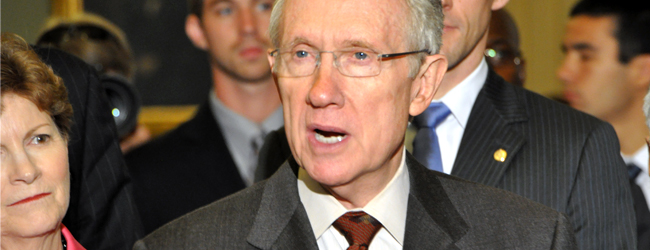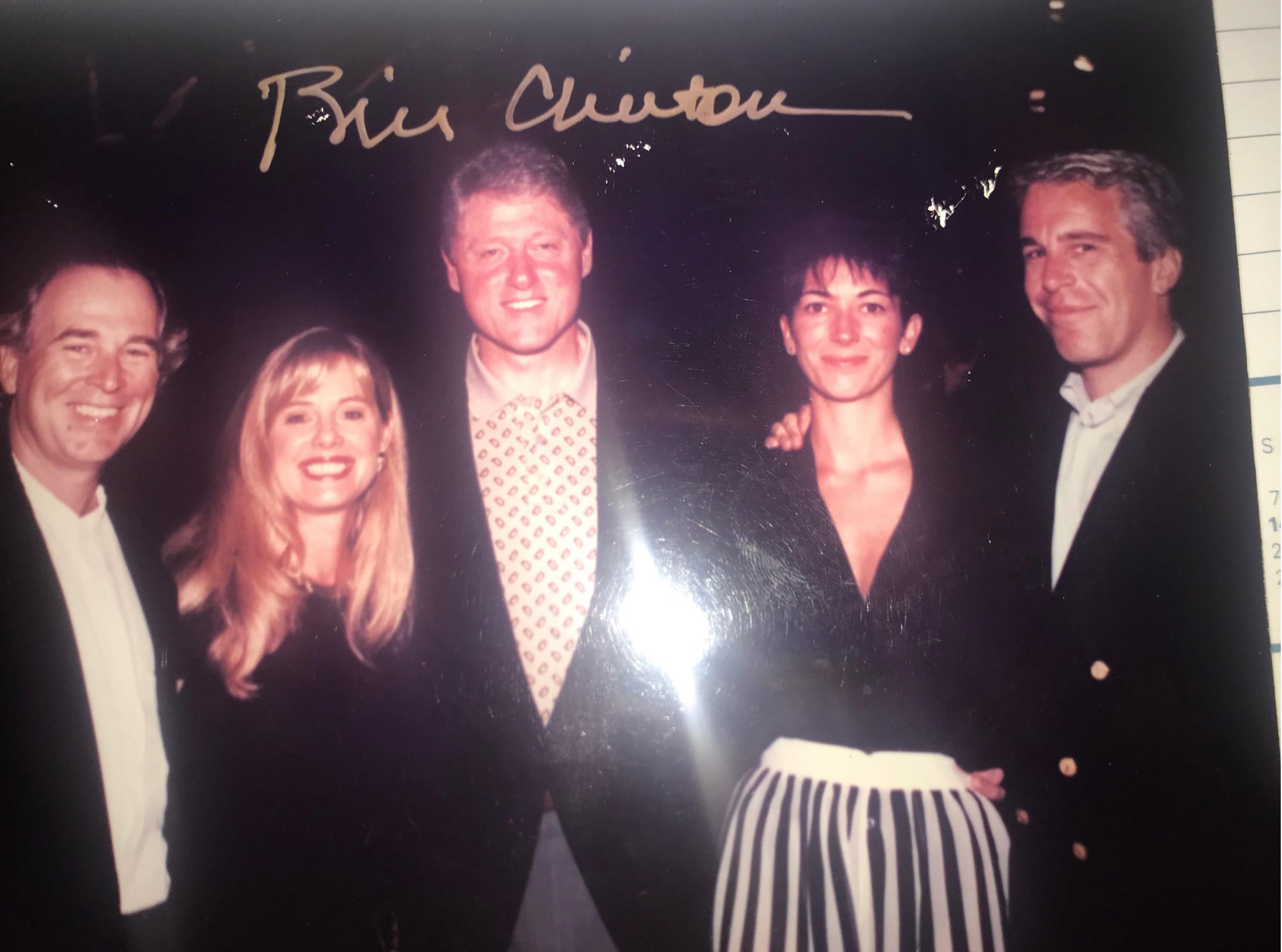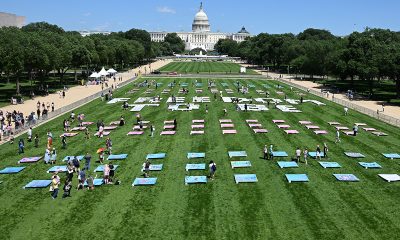National
Key Senate races a focus for LGBT community
Pro-gay Dems face tough fights in Nevada, Wisc., Pa., Colo.

On Election Day, many eyes will be focused on several key Senate races where lawmakers with a history of support for the LGBT community are facing tough challenges on the road to re-election.
By far the most high profile race in this group is taking place in Nevada, where Senate Majority Leader Harry Reid (D-Nev.) is fighting for his political life against Republican Sharron Angle, a Tea Party candidate and former Nevada State Assembly member.
Several polls have Angle ahead of Reid by a few points. On Tuesday, Rasmussen Reports made public a poll that found Angle leading Reid by four percentage points among likely voters.
As majority leader, Reid is responsible for moving forward with pro-LGBT legislation in the Senate and would continue to decide the agenda if he wins on Election Day.
Reid has expressed support for the Employment Non-Discrimination Act and repeal of “Don’t Ask, Don’t Tell.” A Mormon, Reid has also been critical of the Church of Jesus Christ of Latter-day Saints’ lead role in backing Proposition 8 in California, which ended same-sex marriage in the state in 2008.
Michael Mitchell, executive director of the National Stonewall Democrats, said a win for Reid is important to the LGBT community because some would likely blame his loss on his leadership on LGBT issues.
“I have a feeling that’s where the Republicans will go with this, and it will be over ‘Don’t Ask, Don’t Tell,’ or it will be that he was too liberal,” Mitchell said. “And, of course, our issues in that moniker of ‘too liberal.'”
In contrast to Reid, Angle has said “Don’t Ask, Don’t Tell” shouldn’t be repealed until the Pentagon has a chance to finish its review of the policy.
Angle has also said in a questionnaire that she’d refuse campaign contributions from businesses that have pro-gay policies in place. She has, however, reportedly taken contributions from political action committees to which such businesses have donated.
The Republican candidate is also known for having ties to an anti-gay party in Nevada in which she once held membership, the American Independent Party.
In 1994, when Angle was involved in the group, the American Independent Party published a 16-page newspaper ad insert calling for a state constitutional amendment permitting discrimination against LGBT people. The insert refers to LGBT people as “sodomites” and portrays them as “child-molesting, HIV-carrying, Hell-bound freaks.”
Despite Angle’s positions, one Republican LGBT group is looking forward to seeing Reid go because of the economic conditions facing Nevada.
Christian Berle, deputy executive director of the Log Cabin Republicans, said the race in Nevada is “as much about voter distaste with Reid’s record as it is about the positions presented by Angle and her campaign.”
“Nevadans want a senator who will stand for their values and deliver for a state that has a 15 percent unemployment rate, not a legislator who is jockeying for legislation to favor the White House agenda first and foremost,” Berle said.
While enjoying general support among LGBT people, Reid has been criticized for not moving fast enough on pro-LGBT legislation.
Some supporters of “Don’t Ask, Don’t Tell” repeal said he politicized a repeal measure in September by limiting the number of amendments that could have been offered on the bill once it reached the floor.
The Senate was unable to move forward with the legislation, and many senators said the amendment issue prevented them from voting in the affirmative.
But Mitchell said he’s “tired of hearing Republicans and other folks” blame Reid for the failure of “Don’t Ask, Don’t Tell” repeal in the Senate because he said the majority leader was doing his job by limiting the number of amendments on the bill.
“With the incredible obstructionism from the Republicans that were blocking every single bill almost,” Mitchell said. “There are like 420 bills that the Senate needed to pick up that the House passed. As majority leader, he needs to start to pull things together to try and get things through.”
Mitchell said faulting Reid for the failure of “Don’t Ask, Don’t Tell” in the Senate is “placing the blame in wrong place” and said “the blame is solely on the Republicans there.”
Another race of interest is taking place in Wisconsin, where U.S. Sen. Russ Feingold (D-Wis.) is running against Republican Ron Johnson, a wealthy plastics manufacturer.
Many polls have Feingold trailing Johnson. On Tuesday, Rasmussen published a poll that found Feingold behind Johnson by seven percentage points among Wisconsin likely voters. Cook Political Report identifies the race as “leans Republican.”
Feingold is known for having long been a friend to the LGBT community. In 1996, he was among 14 senators to vote against passage of the Defense of Marriage Act.
In the current Congress, Feingold has co-sponsored ENDA and legislation that would end “Don’t Ask, Don’t Tell.” The Wisconsin senator also was responsible for an amendment to State Department budget legislation that would require the U.S. government to take more active role in LGBT issues overseas.
Michael Cole, a Human Rights Campaign spokesperson, said Feingold deserves support from the LGBT community because he has long been a “progressive champion, broadly, and particularly for the LGBT community for years.
“I think that are so many issues in play out in the field that it is hard, I think, for LGBT people to see such a champion in a tough race,” Cole said. “It speaks to the difficult political environment that’s out there right now.”
Mitchell praised Feingold for sometimes being a maverick and said his loss would be “heartbreaking” because his voice is distinct among the Senate Democratic caucus. Earlier this year, the senator joined with most Republicans to vote against financial reform legislation.
“He doesn’t always vote lock step,” Mitchell said. “He’s very much a freethinker, and I think we’re seeing less and less of that in both houses actually.”
Still, an anti-gay label doesn’t fit Johnson. The Republican candidate said he would support repeal of “Don’t Ask, Don’t Tell” on the condition that the Pentagon backs an end to the law.
Last month, Johnson told reporters that he favors nondiscrimination, but wants to see the Pentagon’s report on how “Don’t Ask, Don’t Tell” repeal would affect operations. He said if the report were convincing, he would vote to remove the statute from the books.
Berle said the Wisconsin race represents “a remarkable contrast” between a long-serving politician and “a businessman who knows what it takes to sign the front of a paycheck. Berle also commended Johnson for being willing to vote for repeal of the military’s gay ban.
“Johnson’s support for ending the failed ‘Don’t Ask, Don’t Tell’ policy is representative of a broad swath of Republicans throughout the country who favor open service,” Berle said.
In the center of the country, another race is playing out where the candidates have divergent views on gay issues.
Sen. Michael Bennet (D-Colo.) is vying to retain his seat against Republican Ken Buck, a Tea Party candidate and district attorney in the state.
The race between Buck and Bennet is seen as among the closest in the country. On Monday, Public Policy Polling published numbers finding that, among likely Colorado voters, 47 percent support Buck and while another 47 percent support Bennet.
Buck has made several anti-gay comments throughout the course of his campaign. In a September debate, Buck said he opposes “Don’t Ask, Don’t Tell” repeal because he said the U.S. military should be as “homogeneous as possible.”
In another recent debate on NBC’s “Meet the Press,” Buck said being gay is a choice and compared it to alcoholism.
“I think that birth has an influence over it, like alcoholism and some other things, but I think that, basically, you have a choice,” he said.
By contrast, Bennet has taken pro-LGBT positions since his appointment to his seat in the current Congress, such as signing on as a co-sponsor of ENDA and legislation to repeal “Don’t Ask, Don’t Tell.”
Cole said the choice for LGBT people in the Colorado race is distinct based on the positions of the candidates.
“You have Michael Bennet, who has been a strong voice for the community running against Buck, who just on ‘Meet the Press’ last weekend made his dangerous comments about LGBT people,” Cole said.
Mitchell also said a win for Bennet is important in Colorado because of statements Buck has made against gays as well as recent remarks against the separation of church and state.
“Ken Buck is little crazy, right?” Mitchell said. “His statement of separation of church and state … I think when you start to peel the layers down from that, I think that’s a pretty extreme view.”
But Berle characterized the Colorado race as “a referendum on the failed Democratic leadership” in the Senate.
“Coloradans are looking for a leader who will oppose out of control government spending and support economic policies designed to get the economy back on track,” Berle said.
Berle said Log Cabin “strongly disagrees with Buck’s belief that sexual orientation is a choice,” but recalled the candidate’s previous work as a prosecutor.
“We remember that this is the same man who as district attorney zealously prosecuted the murderers of a young transgender woman in 2008,” Berle said. “Despite our disagreements, this is evidence that Buck is willing to listen on issues important to gay and lesbian Americans.”
Another tight race is unfolding in Pennsylvania, where Rep. Joe Sestak (D-Pa.), a two-term House lawmaker and former Navy admiral, is vying for an open seat against Pat Toomey, a former U.S. House member and former president of the Club for Growth.
A poll published Tuesday by Reuters/Ipsos found that race between Sestak and Toomey is a dead heat. Among the Pennsylvania adults who were polled, 46 percent favored Sestak in the election and another 46 percent supported Toomey.
During his time in the U.S. House, Sestak has been vocal in his support for the LGBT community and repeal of “Don’t Ask, Don’t Tell.” He’s voted for hate crimes protection legislation as well as a version of ENDA.
In contrast, during his earlier tenure in the U.S. House, Toomey voted for a constitutional ban on same-sex marriage in 2004 and a measure in 1999 that would have banned adoption by gays in D.C.
Still, Toomey said earlier this month during a debate he would back repeal of “Don’t Ask, Don’t Tell” if military leaders can ensure an end to the law will improve and not undermine its capabilities.
Berle emphasized support for Toomey based on the former U.S. House member’s “consistent voice for fiscal conservatism.”
“His message resonates with Pennsylvanians who are particularly annoyed with being represented by Sen. Arlen Specter who put his own career ahead of his constituents’ interests when he switched parties,” Berle said.
But Cole also emphasized the distinction between Sestak and Toomey in the Senate race based on the Democratic candidate’s support for the LGBT community.
“You have Joe Sestak, the highest-ranking military officer serving in Congress, who is a staunch supporter of ‘Don’t Ask, Don’t Tell’ repeal, running against the guy whom Rick Santorum called ‘too conservative,” Cole said.
Similarly, Mitchell said a win for Sestak in Pennsylvania is important because the Keystone State is considered a “bellwether” for the rest of the country.
“It’s very middle of the road,” Mitchell said. “I think for there to be a win by Sestak in Pennsylvania softens the blow for some of the other races that we may lose.”
The White House
As house Democrats release Epstein photos, Garcia continues to demand DOJ transparency
Blade this week sat down with gay House Oversight Committee ranking member

Democrats on the House Oversight Committee have released new photos from Jeffrey Epstein’s email and computer records, including images highlighting the relationship between President Donald Trump and the convicted sex offender.
Epstein, a wealthy financier, was found guilty of procuring a child for prostitution and sex trafficking, serving a 13-month prison sentence in 2008. At the time of his death in prison under mysterious circumstances, he was facing charges of sex trafficking and conspiracy to traffic minors.
Among those pictured in Epstein’s digital files are Trump, former President Bill Clinton, former Trump adviser Steve Bannon, actor and director Woody Allen, economist Larry Summers, lawyer Alan Dershowitz, entrepreneurs Richard Branson and Bill Gates, and Andrew Mountbatten-Windsor.
One photo shows Trump alongside Epstein and a woman at a Victoria’s Secret party in New York in 1997. American media outlets have published the image, while Getty Images identified the woman as model Ingrid Seynhaeve.
Oversight Committee Democrats are reviewing the full set of photos and plan to release additional images to the public in the coming days and weeks, emphasizing their commitment to protecting survivors’ identities.
With just a week left for the Justice Department to publish all files related to Epstein following the passage of the Epstein Files Transparency Act, which requires the Justice Department to release most records connected to Epstein investigations, the Washington Blade sat down with U.S. Rep. Robert Garcia (D-Calif.), the ranking member on the Oversight Committee to discuss the current push the release of more documents.
Garcia highlighted the committee’s commitment to transparency and accountability.

“We’ve said anything that we get we’re going to put out. We don’t care who is in the files … if you’ve harmed women and girls, then we’ve got to hold you accountable.”
He noted ongoing questions surrounding Trump’s relationship with Epstein, given their long history and the apparent break in friendship once Trump assumed public office.
“There’s been a lot of questions about … Donald Trump and Jeffrey Epstein. They were best friends for 10 years … met women there and girls.”
Prior to Trump’s presidency, it was widely reported that the two were friends who visited each other’s properties regularly. Additional reporting shows they socialized frequently throughout the 1990s and early 2000s, attending parties at Trump’s Mar-a-Lago resort in Florida and Epstein’s residences. Flight logs from an associate’s trial indicate Trump flew on Epstein’s private jet multiple times, and Epstein claimed Trump first had sex with his future wife, Melania Knauss, aboard the jet.
“We’ve provided evidence … [that leads to] questions about what the relationship was like between Donald Trump and Jeffrey Epstein.”
Garcia stressed the need for answers regarding the White House’s role in withholding information, questioning the sudden change in attitude toward releasing the files given Trump’s campaign promises.
“Why is the White House trying to cover this up? So if he’s not covering for himself … he’s covering up for his rich friends,” Garcia said. “Why the cover up? Who are you hiding for? I think that’s the question.”
He confirmed that Trump is definitively in the Epstein files, though the extent remains unknown, but will be uncovered soon.
“We know that Trump’s in them. Yeah, he’s been told. We know that Trump’s in them in some way. As far as the extent of it … we don’t know.”
Garcia emphasized accountability for all powerful figures implicated, regardless of financial status, political party, or personal connections.
“All these powerful men that are walking around right now … after abusing, in some cases, 14‑ and 15‑year‑old girls, they have to be held accountable,” he said. “There has to be justice for those survivors and the American public deserves the truth about who was involved in that.”
He added that while he is the ranking member, he will ensure the oversight committee will use all available political tools, including subpoenas — potentially even for the president.
“We want to subpoena anyone that we can … everyone’s kind of on the table.”
He also emphasized accountability for all powerful figures implicated, regardless of financial status, political party, or relationship with the president.
“For me, they’re about justice and doing the right thing,” Garcia said. “This is about women who … were girls and children when they were being abused, trafficked, in some cases, raped. And these women deserve justice.”
“The survivors are strong.”
Deputy White House Press Secretary Abigail Jackson issued a statement regarding the release the photos, echoing previous comments from Republicans on the timing and framing of the photos by the Oversight Committee.
“Once again, House Democrats are selectively releasing cherry-picked photos with random redactions to try and create a false narrative,” Jackson said.
“The Democrat hoax against President Trump has been repeatedly debunked and the Trump administration has done more for Epstein’s victims than Democrats ever have by repeatedly calling for transparency, releasing thousands of pages of documents, and calling for further investigations into Epstein’s Democrat friends,”
In a press release on Friday, Garcia called for immediate DOJ action:
“It is time to end this White House cover-up and bring justice to the survivors of Jeffrey Epstein and his powerful friends. These disturbing photos raise even more questions about Epstein and his relationships with some of the most powerful men in the world. We will not rest until the American people get the truth. The Department of Justice must release all the files, NOW.”





(Photo courtesy of the U.S. House Oversight Committee)
The White House
White House deadnames highest-ranking transgender official
Rachel Levine’s portrait altered at HHS

Admiral Rachel Levine — the first transgender person ever confirmed by the U.S. Senate and the highest-ranking trans official in American history — had her official portrait in the Humphrey Building altered, with staff replacing her correct name with her deadname, the name she has not used since 2011.
NPR first reported the change, and an HHS spokesperson confirmed to the outlet that Levine’s portrait had recently been altered. A digital photograph obtained by NPR shows Levine’s former (male) name typed on a placard beneath the portrait, placed under the glass of the frame.
Levine served as a four-star admiral in the U.S. Public Health Service Commissioned Corps under the Biden-Harris administration and was appointed the 17th assistant secretary for health.
During her tenure, Levine oversaw the Commissioned Corps and helped lead national public-health initiatives, including the federal COVID-19 response and vaccination strategy; efforts to address rising syphilis infection rates; HIV/AIDS prevention and treatment programs; and strategies to combat the opioid epidemic, particularly through expanded harm-reduction approaches for the communities most affected.
The Trump-Vance administration’s decision to publicly deadname Levine is widely viewed within the trans community as demeaning and disrespectful. The move comes amid a series of federal policy reversals targeting LGBTQ Americans, particularly trans youth seeking gender-affirming care.
Those actions include: weakening workplace protections for LGBTQ employees; limiting restroom access; downgrading gender-identity discrimination cases; pressuring hospitals to end gender-affirming care; cutting HIV research and prevention funding; removing LGBTQ crisis resources; restricting access to trans-inclusive medical policies for veterans and young people; supporting trans sports bans and threatening funding for teams that include trans athletes; and forcing schools and universities to eliminate DEI and LGBTQ offices, inclusive curricula, gender-neutral bathrooms, and books or training materials addressing LGBTQ issues.
The Trump–Vance administration has also expanded federal censorship by removing LGBTQ language from surveys, agency websites, Smithsonian materials, and human-rights reports; blocking Pride recognitions; creating federal communications that misgender trans women; imposing passport and travel barriers for trans Americans; lifting protections for trans service members; limiting benefits and care for LGBTQ veterans; and pressuring states, universities, and hospitals to end trans-inclusive policies under threat of losing federal research, education, or Medicaid funds. The administration has additionally deported LGBTQ asylum seekers to unsafe conditions, removed LGBTQ issues from global human-rights reporting, and escalated anti-trans rhetoric at public events.
These actions stand in stark contrast to Levine’s public-health record. As assistant secretary for health, she worked to expand LGBTQ+ health data collection, promote equitable vaccine distribution, strengthen national health-equity initiatives, and reduce care disparities experienced by historically underserved communities, including LGBTQ populations. Within HHS, she led councils and task forces dedicated to reducing structural barriers to care and improving community outcomes.
Before joining the federal government, Levine oversaw health and safety for nearly 13 million residents as Pennsylvania’s physician general from 2015–2017 and as Pennsylvania secretary of health from 2018–2021.

Asked by NPR about the alteration of her official portrait, Levine responded that it had been an honor to serve as assistant secretary for health, adding: “I’m not going to comment on this type of petty action.”
Health
The harsh truth about HIV phobia in gay dating
HIV and stigma remain baked into queer dating culture

Uncloseted Media published this article on Dec. 9.
This story was produced with the support of MISTR, a telehealth platform offering free online access to PrEP, DoxyPEP, STI testing, Hepatitis C testing and treatment and long-term HIV care across the U.S. MISTR did not have any editorial input into the content of this story.
By SAM DONNDELINGER | In his room, 19-year-old Cody Nester toggles between Grindr profiles on his phone.
As he senses chemistry with a match, he knows he has to flag something that could be a deal breaker.
“Did you see on my profile that I’m HIV positive?” he writes.
The reply arrives instantly.
“You’re disgusting. I don’t know why you’re on here.” Seconds later, the profile disappears, suggesting Nester is blocked.
“He went out of his way to say that. People could at least be more aware, ask questions, and understand the reality [of living with HIV] instead of attacking us,” Nester told Uncloseted Media.
“I would say 95 percent of people respond that way,” says Nester, who lives in Hollywood, Fla., and works at a Mexican restaurant. “The entire conversation is going fine. They’re down to meet up and then right when I mention [HIV], it’s always, ‘Oh no, never mind.’”
Some other messages he’s received include:
“You’ll never get anything in your life.”
“Why don’t you die?”
“Why are you on here?”
More often, it’s silence, a cold “No” or a sudden block.
“It’s like you’re a white fish in a school of black fish,” he says. “You’re immediately the odd one out.”
Even though Nester’s undetectable status makes it impossible for him to transmit HIV to partners during sex, he experiences stigma around HIV, something which nearly 90 percent of Americans agree still exists, according to a 2022 GLAAD report. And a survey shared in 2019 found that 64 percent of respondents would feel uncomfortable having sex with someone living with HIV, even on effective treatment. The emotional cost of this stigma is a significant barrier to intimacy and can result in a loss of self-esteem, fear of disclosure and suicidal thoughts.
What the science says — and why it doesn’t seem to matter
“The fear comes from antiquated ideas around HIV,” says Xavier A. Erguera, senior clinical research coordinator at University of California, San Francisco,’s Division of HIV, Infectious Diseases & Global Medicine. “A lot of people who are newly diagnosed still fear it’s a death sentence. Even though we have medications now to treat it effectively, and it’s basically a chronic condition, people haven’t caught up.”
Since 1996, antiretroviral therapies have developed to where they can suppress the virus to levels so low that it is undetectable in the blood, and thus not able to be transmitted to sexual partners. This is known as Undetectable = Untransmittable, or U=U. According to a Centers for Disease Control and Prevention report from 2024, 65 percent of HIV-positive cases are virally suppressed.
Another line of defense is pre-exposure prophylaxis (PrEP), which reduces the risk of acquiring HIV from sexual intercourse by roughly 99 percent when taken as prescribed. Approved by the Food and Drug Administration in 2012, the medication launched as a once-a-day pill and was hailed as a breakthrough as it transformed the sex lives of gay men, which had been shaped by decades of fear about HIV complications and about where AIDS came from.
“Internal logic doesn’t reflect what we know scientifically,” says Kim Koester, associate professor in the Department of Medicine at UCSF. “I was very optimistic when PrEP came out. The drug works, so why wouldn’t everyone use it?”
Even with PrEP use on the rise, less than 600,000 Americans used it in 2024, and Koester says skepticism and judgments about taking the drug persist.
“The phobia is pervasive,” Koester told Uncloseted Media. “People believe that others get the disease because of their lifestyle. … PrEP was supposed to be the antidote to the threat of HIV, reduce the anxiety, and make you more open to who you are and the sex you want. It’s supposed to be liberating. It is part of the answer. But it’s not enough. We don’t have enough people using PrEP for it to make the dent in the stigma we need.”
According to a 2023 study of seven informants living with HIV, public stigma stems from problematic views from society that those living with HIV are “a dangerous transmission source,” “disgraceful” and “violators of social and religious norms who have committed deviant behavior.”
Laramie Smith, assistant professor of Global Public Health at the University of California, San Diego, says this stigma is unwarranted and fueled by misunderstanding:
“With today’s treatments, it shouldn’t be a life-altering identity shift. It should be no different than, ‘I have diabetes.’ If you’re virally suppressed, it shouldn’t matter whether you’re friends with someone, whether you’re sleeping with someone — the science shows us that.”
How HIV phobia shows up online
Nester, who contracted HIV last year from a Grindr hook-up who insisted he was negative, says he is just starting to accept his diagnosis. “I didn’t go back on the apps for a long time after that. It messed with my mental health … realizing I’d have to take medication for the rest of my life.”
Since he started dating again this year, returning to apps like Grindr and Sniffies, he has faced a new normal. He tries to do everything “right” and disclose his status early. Even on his Grindr profile, he identifies as “poz,” slang for HIV-positive.
Still, he says most people ghost him once they find out. “The second I bring it up, it’s ‘No,’” says Nester. “The amount of discrimination you get … it’s always the same pattern. … People don’t know, and they don’t want to know. It messes with you.”
This discrimination may be fueled by a deprioritization of HIV awareness programs across the country. Earlier this month, the U.S. State Department did not commemorate World AIDS Day for the first time in 37 years. HIV prevention programs have been slashed, especially in conservative districts, and only 25 states and D.C. require both HIV and sex education. In many states, health curricula often lag behind current science and omit teaching about PrEP, gay sex and concepts like U=U. Research shows that Gen Z is currently the least educated generation about HIV.
“I could go all day explaining HIV, but people don’t want to listen,” says Nester, who is part of Gen Z. “People don’t want to learn about it; they just want to avoid it.”
HIV anxiety and public stigma shaped by history
Even in more progressive areas, stigma still exists. Damian Jack, a 45-year-old from Brooklyn, remembers sitting in an exam room in 2009 as a doctor explained how low his T-cell count was, which is a hallmark of HIV infection.
“I started hysterically crying,” he told Uncloseted Media. “HIV meant death. That’s what I thought.”
In 1981, when Jack was 1 year old, the first reports of a mysterious and deadly immune deficiency syndrome, which would later be named AIDS, appeared in the U.S. Growing up, Jack saw countless terrifying images of men on their deathbeds with Kaposi sarcoma, the purple lesions the media once called “gay cancer.” Public misinformation and fearmongering spread ideas that AIDS was a disease that “only gay men and drug users get.” And politicians often equated it with homosexuality and moral failure, calling it a “gay plague.” It wasn’t until September 1985, four years after the crisis began and thousands had died, that President Ronald Reagan first publicly mentioned AIDS.
Decades later, the emotional residue of that era and the shame associated with the virus lingers.
Hours after learning of his diagnosis, Jack faced his first encounter with rejection. He already had a date planned that night, and his doctor and friends encouraged him to go.
They had a great time until the date asked him: “Are you negative or positive?”
He told the truth.
“It was just understood there wouldn’t be a second date,” says Jack. “I remember thinking, ‘This is how dating is going to be now.’ I felt so anxious telling guys. It followed me everywhere. I don’t think that anxiety ever truly goes away.”
The emotional impact of HIV stigma
For those who are HIV-negative, experts say that “stigma’s whole design is to ‘other.’”
“The ‘us versus them’ creates that false sense of safety when it comes to HIV,” says Smith. “If I can believe that someone did something to deserve their diagnosis, and I’m not that [kind of person], then I’m safe.”
This othering is painful and can lead to shame, fear and isolation, and it is linked to a higher risk of depression and anxiety.
“If I’m undesirable, and that’s what those messages are communicating, that threatens your sense of safety, your sense of belonging and the fundamental desire we all have to be loved,” Smith says. “And that starts to reinforce the thinking that ‘I am not worthy. This virus that I have means that I’m not lovable. I am not safe showing up among other men.’”
“I pretend it doesn’t hurt, but some things do sting a little bit,” Nester says. “You start thinking, ‘Am I really that disgusting? Am I really that singled out?’”
When public stigma turns inward
“Internalized stigma is what occurs when applying the stereotypes about who gets HIV, the prejudice, the negative feelings, onto yourself,” says Smith.
In 2024, 38 percent of people living with HIV reported internalized stigma. And studies show that it can predict hopelessness and lower quality of life, even when people are engaged in care or virally suppressed.
Internalized stigma can also affect how people practice safe sex and communicate about the virus. A 2019 survey of men who have sex with men found that individuals who perceived greater community-level stigma were less likely to be aware of — and use — safer-sex functions available on dating apps, such as HIV-status disclosure fields, as well as sexual health information and resources.
“[HIV phobia] is probably the most intense, subvert bigotry I think you could experience,” Joseph Monroe Jr., a 48-year-old living in the Bronx, told Uncloseted Media.
On dating apps, men have messaged him things like, “You look like you’ve got that thing” and “Go ahead and infect someone else.”
Monroe has also dealt with misinformed people who rudely opine about how he contracted the virus: “Who fucked you? That’s how you got it, right?” people will say to him.
“You end up internalizing all these stereotypes about who gets HIV — that you were promiscuous, that you didn’t care about yourself, that you did something wrong,” says Smith. “You carry that in, and then you have to relearn: ‘No, I didn’t. This is just a health condition.’”
What HIV acceptance looks like and raising awareness
For those living with HIV, acceptance feels far away.
“You’re living under this threat of HIV and the threat that others find you threatening. It inhabits you socially and sexually,” Koester says. “People are hunkering down. Not putting themselves out there and having a mediocre quality of life. To have a sense of empowerment, you have to be legitimate and seen in the world and it’s hard to do that with the stigma that exists.”
Researchers say the path forward lies as much in conversation as in medicine.
Koester says she talks about HIV and PrEP anywhere she can, including in salons, cafes and restaurants. “Whenever I get into a cab with someone, I’m going to bring up HIV so the driver gets accustomed to hearing about it. … We have a long way to go in terms of exposure and awareness and every little bit helps.”
Part of this lies in increasing awareness through targeted marketing campaigns. PrEP is still profoundly misunderstood outside major urban centers, with uneven uptake among minority groups and usage gaps in the Bible Belt. And a 2022 U.S. survey found that 54.5 percent of people living with HIV didn’t know what U=U meant, and less than half of Americans agree that people living with HIV who are on proper medications cannot transmit the virus.
While eradicating stigma is slow, there is hope for acceptance.
Years after Jack’s diagnosis, in 2021, he told a man he was on a third date with that he was HIV-positive but undetectable. His date’s reply was almost casual:
“Oh — is that it? I thought you were going to say you had a boyfriend or something. I’m on PrEP. You’re fine.”
“It felt so good to hear him say that and accept me,” says Jack. “I was like, ‘This is my person. You’re my person.’” One year later, they got married.
Back in Florida, 19-year-old Cody Nester isn’t feeling this acceptance. He still scrolls past profiles that read “Only negative guys” and tries to ignore the hateful messages.
“It still hurts, but I know it’s coming from fear,” he says. “I wasn’t too informed about HIV before I got it. … When I got it, I really jumped into the rabbit hole and began to learn. I really do think [HIV and stigma] is because people are not knowledgeable. … When people don’t know details, they tend to get scared.”
Additional reporting by Nandika Chatterjee.
-

 Congress3 days ago
Congress3 days agoEXCLUSIVE: George Santos speaks out on prison, Trump pardon, and more
-

 Opinions4 days ago
Opinions4 days agoThe beginning of the fall of Trump
-

 Congress5 days ago
Congress5 days agoMarkey reintroduces International Human Rights Act in Senate
-

 Egypt4 days ago
Egypt4 days agoIran, Egypt object to playing in Seattle World Cup ‘Pride Match’



















